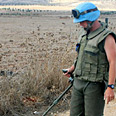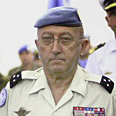

What's really happening on the Lebanese border? The presence of UNIFIL and Lebanese forces on Lebanon's southern border is finally producing some results for Israel.
Granted, Hizbullah is still succeeding in rebuilding its fighting force and increase its rocket stores in Lebanon north of the Litani.
Furthermore, Ynet recently received intelligence information the international force discovered and demolished two rocket caches, as well as additional weapons abandoned by Hizbullah.
UNIFIL soldiers transferred the uncovered rockets to Lebanese troops in the area, who detonated them in a controlled manner, under the watch of the UN soldiers.
The "natural reserves" left behind by Hizbullah after the war, were also addressed. There has been ongoing and improving coordination between IDF and UNIFIL troops, to deal with this problem.
A UNIFIL liaison officer has a permanent desk in the Northern Command and there are regular meetings between senior officers in UNIFIL and the IDF's Strategic Planning and International Military Cooperation Division.
IDF statements – all the way to France
The only tension-causing issue remaining between the IDF and UNIFIL are Israel Air Force sorties into Lebanese aerial territory. In a few cases, French soldiers in UNIFIL almost opened fire at Israel planes circling overhead.
The French soldiers claimed that Israeli planes were executing overflights that resembled mock raids, meant to frighten the Lebanese and provoke the soldiers.
In response to such incidents, UNIFIL Commander General Pelligrini of France approached the UN headquarters in New York and asked them to consider granting approval for UNIFIL soldiers to fire at Israeli planes for violating UN Security Council resolution 1701.
French Defense Minister Michele Alliot-Marie, usually a supporter of Israel, rebuked Israel and went so far as to make direct threats.
Israel tried to explain to France and the UN that these flights are necessary for photographing and intelligence gathering purposes, but to no avail.
In informal conversations, UNIFIL representatives told the IDF that they may agree to ignore such flights for the time being, until UNSCR 1701 is fully implemented and Hizbullah stops rearming.
However, they do not understand why Israeli planes need to fly low as intelligence gathering is usually executed at higher heights, and thus refused to concede to low overflights.
Hizbullah hiding in natural terrain
IDF sources insisted on convincing the French that flying low was also required for photographic intelligence gathering in order to uncover bunkers and rocket caches, as at low heights, the IDF has methods to gather and photograph information in rocky or wooded areas.Hizbullah, in order to recover their loss of military supplies, has been building new bunkers and caches, hidden among the natural coverage from rocks and foliage along the Litani.
Sources in the IDF posit that some of the bunkers are hidden south of the Litani, underneath the noses of the French soldiers. In order to discover them, and to verify that militants are not returning to similar "natural preserves" closer to Israel's northern border, the IAF must take low-height aerial photographs.
The filming equipment necessary for such photographs is too heavy to load on unmanned aerial devices (UAVs) and, as such, must be flown on traditional IAF aircraft.
France's assent was granted in the end, but it required an explanatory visit to Paris by the head of the IDF Planning Branch Maj. Gen. Ido Nehushtan. During his visit, a French anti-aircraft unit almost shot at Israeli planes east of Tyre.
Nehushtan met with senior French officers in Paris and it remains to be seen whether the understanding reached there will suffice.
Avoiding conflict with Germany
German naval operations along the Lebanese coast were also accompanied by two volatile interactions with the IAF, leading to a political storm in Germany.
The first incident occurred between when a German naval force, not belonging to UNIFIL, entered Israeli territorial waters. The ship, whose task is to prevent arms smuggling into Lebanon, unknowingly crossed into an area over which IAF fighter jets were practicing aerial attacks.
The IDF repudiated naval claims that shots were fired from the jets. Nonetheless, Prime Minister Ehud Olmert called German Chancellor Angela Merkel to apologize for the misunderstanding.
A few days later, German sources said Israeli jets fired a German naval helicopter. Israel denies that shots were fired and said the planes approached the helicopter after it took off Tuesday from a German ship without notifying Israeli forces.
Germany confirmed at the time that that an incident had occurred, but gave no details. It subsequently received assurances from Defense Minister Amir Peretz that the air force would not carry out any hostile fire or maneuvers around German vessels.















